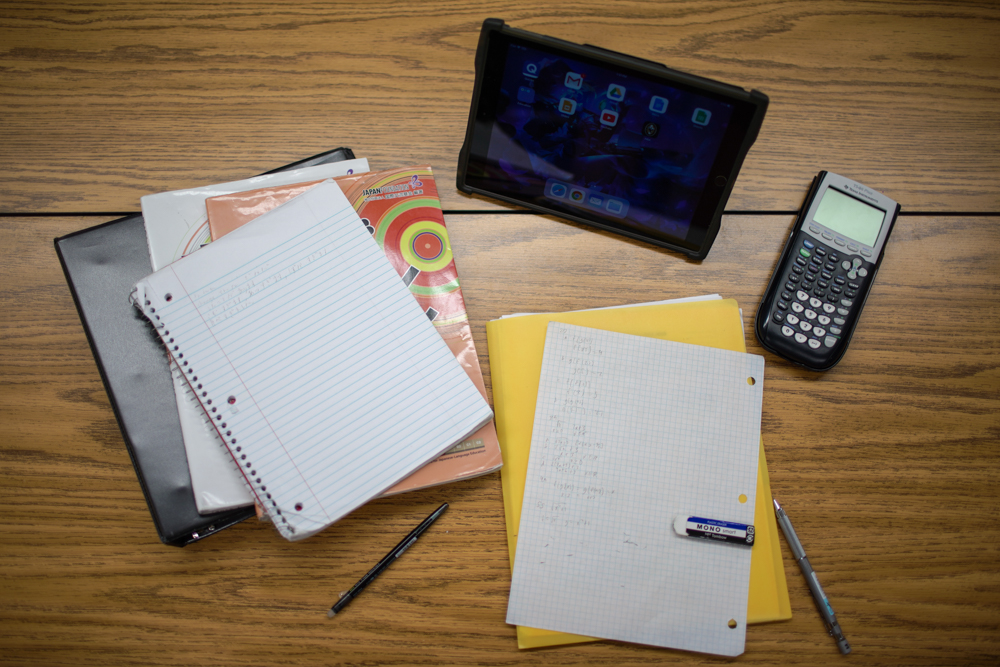New Schedule Helps Students Manage Workload

The new schedule features all seven classes on the first day of the week, and two sets of extended period days for the rest of the week.
This change comes amidst the school’s efforts to make homework load more manageable for students. According to high school principal Marsha Hirae, the school administration recognized that HBA has a reputation of being a homework heavy school. A homework committee, comprising of teachers, was formed to research ways to tackle the issue but despite efforts like No Homework Weekend, many students reported not seeing a reduction in their overall workload.
Then in the winter of 2017, a group of students and teachers from HBA attended an education conference that challenged participants to think of ways to improve the life and culture of HBA. HBA students Rena Takatsuka, Kathryn Harada and Jeremy Oyer named three areas where they saw the greatest need for improvement: homework load, fear of failure and cafeteria food. In looking for ways to address the homework load at HBA, the students looked to other schools and saw that block scheduling was a possible solution. “Kathryn Harada was the one to come up with the idea,” said Takatsuka, then a junior, “and Jeremy Oyer and I worked with her to refine it.” With ideas like this in mind, the students returned to HBA to share them with President Ron Shiira, Human Resource director Stephen Arita and high school principal Marsha Hirae.
Close to 78% of respondents (out of 350 students from grades seven through twelve) report that the new schedule has reduced their homework load.
According to Hirae, the school was already looking for ways to improve and lighten the homework load. The students’ suggestions became the final push for a schedule change. Hirae explained the need for change is driven by the school’s belief that everyone should live a balanced life where one can “work well, play well and rest well.” She added that the hope is to make homework more manageable for all students, especially the ones who participate in sports, live far away or get home late. With the double extended schedule, the frequency of classes are reduced, thus increasing the amount of time students have to complete their work before they have a class again.
According to a recent Eagle Eye poll, close to 78% of respondents (out of 350 students from grades seven through twelve) report that the new schedule has reduced their homework load. About half of the students say they spend one to two hours on homework per day on average, which is considered a reasonable amount by teachers and students alike. When presented with the poll results, Hirae was encouraged, saying, “That is a good statistic.”
The new schedule also also features an additional Z at the end of Thursdays, in addition to the existing Tuesday Z period. Curriculum Director Pat Ota explained that the goal of this additional Z period is eventually to become a student-directed time. The hope is that students will get into the routine of using the time to get work done or get help from teachers, even after the period no longer becomes a mandatory one.
Sophomore Malama Fujimoto is glad for the schedule change and says it gives him more time to get homework done. Takatsuka agreed, saying, “I absolutely love the schedule change, and my most of my friends agree that they like this schedule better.”
The schedule has also freed up some time for the teachers. Math department chair Ross Mukai said, “I find myself having more time in the work day to grade and prepare…[and] I am able to get my student’s papers back to them with feedback.” English teacher Dawson Vorderbruegge is also appreciative of the change. “I enjoy teaching longer periods,” he said, “[and] it seems like students have less stress, and [the] campus has been a more pleasant place.”
The administration will officially assess the effect of the new schedule via the November course evaluation surveys. For now, at least according to the Eagle Eye poll, things are looking up.
